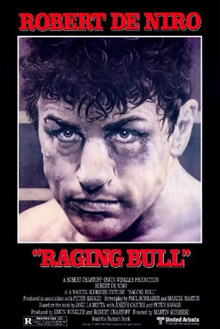Our website is made possible by displaying online advertisements to our visitors.
Please consider supporting us by disabling your ad blocker.
Raging Bull
| Raging Bull | |
|---|---|
 Theatrical release poster by Tom Jung | |
| Directed by | Martin Scorsese |
| Screenplay by | |
| Based on | |
| Produced by | |
| Starring | Robert De Niro |
| Cinematography | Michael Chapman |
| Edited by | Thelma Schoonmaker |
Production companies | Chartoff-Winkler Productions, Inc.[1] |
| Distributed by | United Artists |
Release dates |
|
Running time | 129 minutes[2] |
| Country | United States |
| Language | English |
| Budget | $18 million[3] |
| Box office | $23.4 million[3] |
Raging Bull is a 1980 American biographical sports drama film directed by Martin Scorsese and starring Robert De Niro, Joe Pesci, Cathy Moriarty, Theresa Saldana, Frank Vincent, and Nicholas Colasanto in his final film role. The film is an adaptation of former middleweight boxing champion Jake LaMotta's 1970 memoir Raging Bull: My Story. It follows the career of LaMotta, played by De Niro, his rise and fall in the boxing scene, and his turbulent personal life beset by rage and jealousy.
Scorsese was initially reluctant to develop the project, though he eventually came to relate to LaMotta's story. Paul Schrader re-wrote Mardik Martin's first screenplay, and Scorsese and De Niro together made uncredited contributions thereafter. Pesci was an unknown actor prior to the film, as was Moriarty, whom Pesci suggested for her role. During principal photography, each of the boxing scenes was choreographed for a specific visual style and De Niro gained approximately 60 pounds (27 kg) to portray LaMotta in his later post-boxing years. Scorsese was exacting in the process of editing and mixing the film, expecting it to be his last major feature.
Raging Bull premiered in New York City on November 14, 1980, and was released in theaters on December 19, 1980. The film had a lukewarm box office of $23.4 million against its $18 million budget. The film received mixed reviews upon its release; while De Niro's performance and the editing were widely acclaimed, it garnered criticism due to its violent content. Despite the mixed reviews, the film was nominated for eight Academy Awards at the 53rd Academy Awards (tying with The Elephant Man as the most nominated film of the ceremony), including Best Picture and Best Director, and won two: Best Actor for De Niro (his second Oscar) and Best Editing.
After its release, Raging Bull went on to garner high critical praise, and is now considered one of the greatest films ever made. In 1990, it became the first film to be selected in its first year of eligibility for preservation in the United States National Film Registry by the Library of Congress as being "culturally, historically, or aesthetically significant",[4][5] and the American Film Institute ranked it as the fourth-greatest American movie of all time.
- ^ "Raging Bull". American Film Institute. Retrieved September 1, 2021.
- ^ "Raging Bull". British Board of Film Classification. Archived from the original on December 21, 2014. Retrieved July 29, 2013.
- ^ a b "Raging Bull (1980) – Financial Information". The Numbers. Archived from the original on December 21, 2014. Retrieved December 21, 2014.
- ^ "Complete National Film Registry Listing". Library of Congress. Archived from the original on October 31, 2016. Retrieved May 8, 2020.
- ^ Gamarekian, Barbara (October 19, 1990). "Library of Congress Adds 25 Titles to National Film Registry". The New York Times. ISSN 0362-4331. Archived from the original on October 4, 2020. Retrieved May 8, 2020.
Previous Page Next Page


